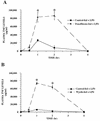Effect of peroxisome proliferator-activated receptor alpha activators on tumor necrosis factor expression in mice during endotoxemia
- PMID: 10377130
- PMCID: PMC116535
- DOI: 10.1128/IAI.67.7.3488-3493.1999
Effect of peroxisome proliferator-activated receptor alpha activators on tumor necrosis factor expression in mice during endotoxemia
Abstract
Inflammatory mediators orchestrate the host immune and metabolic response to acute bacterial infections and mediate the events leading to septic shock. Tumor necrosis factor (TNF) has long been identified as one of the proximal mediators of endotoxin action. Recent studies have implicated peroxisome proliferator-activated receptor alpha (PPARalpha) as a potential target to modulate regulation of the immune response. Since PPARalpha activators, which are hypolipidemic drugs, are being prescribed for a significant population of older patients, it is important to determine the impact of these drugs on the host response to acute inflammation. Therefore, we examined the role of PPARalpha activators on the regulation of TNF expression in a mouse model of endotoxemia. CD-1 mice treated with dietary fenofibrate or Wy-14,643 had fivefold-higher lipopolysaccharide (LPS)-induced TNF plasma levels than LPS-treated control-fed animals. Higher LPS-induced TNF levels in drug-fed animals were reflected physiologically in significantly lower glucose levels in plasma and a significantly lower 50% lethal dose than those in LPS-treated control-fed animals. Utilizing PPARalpha wild-type (WT) and knockout (KO) mice, we showed that the effect of fenofibrate on LPS-induced TNF expression was indeed mediated by PPARalpha. PPARalpha WT mice fed fenofibrate also had a fivefold increase in LPS-induced TNF levels in plasma compared to control-fed animals. However, LPS-induced TNF levels were significantly decreased and glucose levels in plasma were significantly increased in PPARalpha KO mice fed fenofibrate compared to those in control-fed animals. Data from peritoneal macrophage studies indicate that Wy-14,643 modestly decreased TNF expression in vitro. Similarly, overexpression of PPARalpha in 293T cells decreased activity of a human TNF promoter-luciferase construct. The results from these studies suggest that any anti-inflammatory activity of PPARalpha in vivo can be masked by other systemic effects of PPARalpha activators.
Figures




Similar articles
-
Peroxisome proliferator-activated receptor activators inhibit lipopolysaccharide-induced tumor necrosis factor-alpha expression in neonatal rat cardiac myocytes.Circ Res. 2000 Sep 29;87(7):596-602. doi: 10.1161/01.res.87.7.596. Circ Res. 2000. PMID: 11009565
-
Peroxisome proliferator-activated receptor alpha-independent effects of peroxisome proliferators on cysteinyl leukotriene production in mast cells.Eur J Pharmacol. 2007 Feb 5;556(1-3):172-80. doi: 10.1016/j.ejphar.2006.10.032. Epub 2006 Oct 19. Eur J Pharmacol. 2007. PMID: 17113579
-
PPARalpha activators inhibit tissue factor expression and activity in human monocytes.Circulation. 2001 Jan 16;103(2):213-9. doi: 10.1161/01.cir.103.2.213. Circulation. 2001. PMID: 11208679
-
Fibrates suppress fibrinogen gene expression in rodents via activation of the peroxisome proliferator-activated receptor-alpha.Blood. 1999 May 1;93(9):2991-8. Blood. 1999. PMID: 10216095
-
Mechanism of action of the nongenotoxic peroxisome proliferators: role of the peroxisome proliferator-activator receptor alpha.J Natl Cancer Inst. 1998 Nov 18;90(22):1702-9. doi: 10.1093/jnci/90.22.1702. J Natl Cancer Inst. 1998. PMID: 9827524 Review.
Cited by
-
Peroxisome proliferator-activated receptor agonists inhibit inflammatory edema and hyperalgesia.Inflammation. 2002 Jun;26(3):121-7. doi: 10.1023/a:1015500531113. Inflammation. 2002. PMID: 12083418
-
Lipid oxidation dysregulation: an emerging player in the pathophysiology of sepsis.Front Immunol. 2023 Aug 3;14:1224335. doi: 10.3389/fimmu.2023.1224335. eCollection 2023. Front Immunol. 2023. PMID: 37600769 Free PMC article. Review.
-
Fenofibrate Downregulates NF-κB Signaling to Inhibit Pro-inflammatory Cytokine Secretion in Human THP-1 Macrophages and During Primary Biliary Cholangitis.Inflammation. 2022 Dec;45(6):2570-2581. doi: 10.1007/s10753-022-01713-1. Epub 2022 Jul 15. Inflammation. 2022. PMID: 35838934 Free PMC article.
-
Repurposing Peroxisome Proliferator-Activated Receptor Agonists in Neurological and Psychiatric Disorders.Pharmaceuticals (Basel). 2021 Oct 8;14(10):1025. doi: 10.3390/ph14101025. Pharmaceuticals (Basel). 2021. PMID: 34681249 Free PMC article. Review.
-
Characterization of the adipose tissue atrophy induced by peroxisome proliferators in mice.Lipids. 2002 Feb;37(2):139-46. doi: 10.1007/s11745-002-0873-7. Lipids. 2002. PMID: 11908906
References
-
- Akira S, Hirano T, Taga T, Kishimoto T. Biology of multifunctional cytokines: IL-6 and related molecules (IL 1 and TNF) FASEB J. 1990;4:2860–2867. - PubMed
-
- Baeuerle P A, Henkel T. Function and activation of NF-kappa B in the immune system. Annu Rev Immunol. 1994;12:141–179. - PubMed
-
- Blok W L, Katan M B, van der Meer J. Modulation of inflammation and cytokine production by dietary (n-3) fatty acids. J Nutr. 1996;126:1515–1533. - PubMed
-
- Bojes H K, Germolec D R, Simeonova P, Bruccoleri A, Schoonhoven R, Luster M I, Thurman R G. Antibodies to tumor necrosis factor alpha prevent increases in cell replication in liver due to the potent peroxisome proliferator, Wy-14,643. Carcinogenesis. 1997;18:669–674. - PubMed
-
- Chengyu J, Ting A T, Seed B. PPAR gamma agonists inhibit production of monocyte inflammatory cytokines. Nature. 1998;391:82–86. - PubMed
Publication types
MeSH terms
Substances
Grants and funding
LinkOut - more resources
Full Text Sources
Molecular Biology Databases
Research Materials

